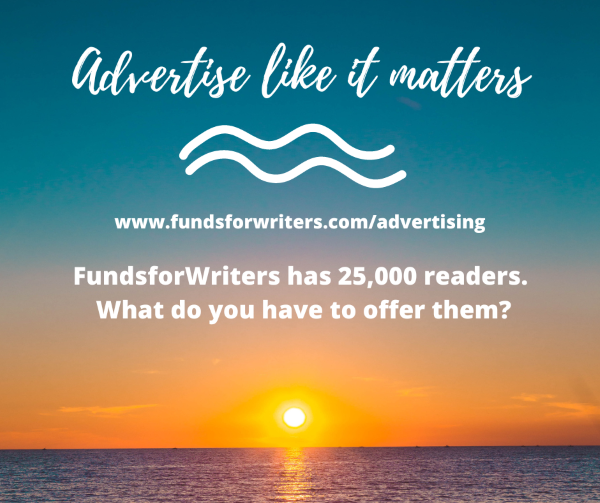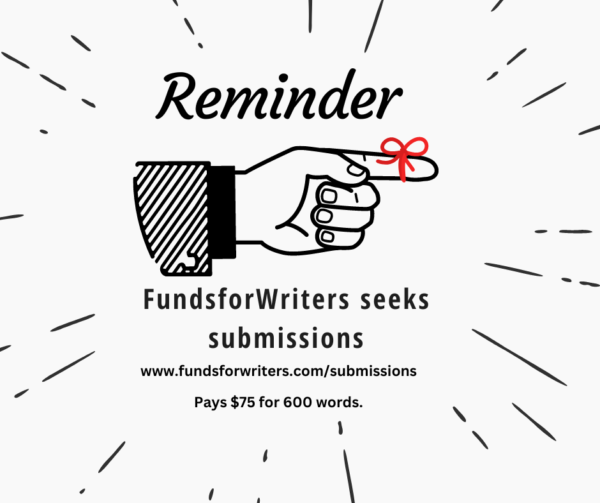|
|
TOP SPONSOR

Got stories in your head? Want to try your hand at writing fiction?
Discover a new way to write & share the stories in your head... without facing the blank page or scrolling through thousands of uninspiring writing prompts.
Learn more here.
EDITOR'S THOUGHTS
THE FUTURE OF PUBLISHING
I know, I know. How many times do we see this in blog posts? I usually delete them as if they carried COVID, but between Jane Friedman's post in The Hot Sheet (subscription only ) and Penny Sansevieri's in A Marketing Expert, I figured it time to say something about the direction the
publishing industry is leaning.
I do not predict anything in stone. In some ways this industry seems like a dinosaur, hung up in ancient ways, then in other it shoots out with innovation (i.e., Spotify is jumping with both feet into audiobooks). If anything, the recent DOJ – Penguin Random House antitrust trial has opened our eyes to the self-absorbed mentality of the Big 5 publishers versus that of the
smaller press, and that doesn't even mention self-publishing.

First, the words that resonated around the world from those hearings involved advances and sales. The loudest words remembered of late are "90 percent of titles sell fewer than 2,000 units." That's traditional books, people. Not self-published. The other quote was "about 98 percent of the books that publishers released in 2020 sold fewer than 5,000 copies."
Before we faint from gasping at that reality, face the music. With traditional, hybrid, and self-publishing out there, anyone with a thought in their head can publish a book. Those numbers seem incredibly small, but an insane number of people are publishing something. It is no longer whether you can publish but how well can you market and make yourself be heard enough to sell that 5,000 copies? Frankly, if you include all the self-publishing, those numbers drop to an insanely lower number.
Like, under a 100 copies.
Even Barnes & Noble is shrinking back when it comes to taking chances with books. They are sticking with tried-and-true authors with large backlists. Hey, why not stick with what works, they say. Why take risks on those who haven't proven themselves?
My first book came out in 2012. I had nibbles from New York, one editor running me down at a conference excited at my work but was unable to get it past her other editors. Made me feel good. However, I watched the ups and downs, ins and outs of the industry and decided I wanted a smaller press. It felt more stable. It wasn't self-publishing and it held none of the politics and callous decision-making of the Big 5.
I never looked back. I love my choice.
Penny Sansiveri predicts: "I foresee that boutique houses and small presses (different from hybrid publishers which are still, by and large, self-publishing) are going to rule this industry."
I've been believing that for years. And that's why you see so many of them posted in FundsforWriters. Next week: the pros and cons of working with a small press.

221412874 © State Library and Archives Florida | Dreamstime.com
SUPER SPONSOR
HOPE'S APPEARANCES
|

|
- October 29, 2022 - The Coffee Shelf, 130 Amicks Ferry Rd, Chapin, SC - 8-11 AM
- November 10, 2022 - Signing for new release, Badge of Edisto, Edisto Bookstore, Edisto, SC - 3-5 PM
- November 19, 2022 - Crooked Creek Holiday Market, 1098 Old Lexington Hwy, Chapin, SC - 8:30 - 2:00
- June 3-10, 2023 - Writing Retreat on the Maine Coast - Special Guest - Sponsored by Joan Dempsey, author and teacher
Email: hope@chopeclark.com to schedule events, online or otherwise. There's starting to be life out there! |
SUCCESS QUOTE
You can't expect everyone to have the same dedication as you.
~Jeff Kinney, Author Diary of a Wimpy Kid
SUccess Story
If you have a success story you believe was prompted by FundsforWriters, please share with us! Send to hope@chopeclark.com
Featured article
Oh, The Places You'll Go (Without An Agent)
By Alex J. Coyne
Literary agents have an important role to play, but the agent route is not for every writer. As I look back on over a decade of work as a lone writer and journalist, there's a fair amount of advice about how I've managed without one.
Here's how to steer your literary career forward (without an agent).
First, What You'll Miss Without an Agent
Forget about agented only submissions if this is your chosen route. Publishers and other literary markets will specify in their guidelines, and they do not negotiate their stance. The good news is that most publishers are no longer agent exclusive. If you're not after a movie deal or international rights negotiations right now, you'll get by just fine.

I, Author
Agents represent authors, but authors without agents represent themselves.
Where literary agents would negotiate rates or press appearances, individual authors fulfill the same role. Writers become business people, not to be taken lightly.
Biographical information, from LinkedIn to About the Author, is yours to update. Relationships with publishers (and editors) are yours to seek and strengthen.
Agents do market research, meaning you'll have to do that, too. Monitor your market niche from the business side of things. The best ways are bestseller lists, industry news, and Google Trends. Publishersmarketplace.com is a good start.
Press
Good and bad press make up a large part of any agent's job. Snag headlines, get profiled for features, and navigate the endless sea of podcasts and internet radio.
PR work takes patience, time, and material to build an audience. Establish some conversation starters about your own work, and stay in touch with stations, blogs, local businesses, and publications.
Actually, agents generate press, and so should you. “Out of sight, out of mind” is a true fact for authors, and at least one good interview every three months or so keeps you in the public thought.
Contracts Sans Agents
Agents protect their clients by negotiating contracts on their behalf, often as a middle-person between two fields. Congratulations, lone writer, you'll want to learn your way around basic contract terms (very) fast.
https://www.writersdigest.com/get-published-sell-my-work/publishing-contracts-101
https://www.morse.law/news/book-publishing-contracts/
Understand rights, and know how you are selling or leasing your intellectual property. Agents can sell something well, but agents also know how to re-sell older work (and when it's legal).
Never sign blind. Research, spend time on it, and negotiate. That's what business is about. Writers often hold back, but agents never do. That's often why they're successful.
Legal Insurance (For Writers)
For big or long-term contracts, a lawyer is especially advised.
The affordable answer to this is a legal business insurance plan. Available through financial providers and some legal firms, you can get coverage (of up to a certain amount of legal costs, document drafting, and legal representation) for a monthly fee.
Without an agent to stick up for your rights, learn to hold your own. If you ever have to pay a lawyer by the hour to look at a contract, you'll wish that you had legal insurance.
https://www.legalzoom.com/articles/legal-insurance-for-businesses
You can also join the Author’s Guild for guidance and access to legal help as well as legal insurance.
“Market Potential”
Market potential is the literary world's unique selling point.
Writers know language, while an agent has consumer psychology and business planning skills. Writers are often artistically inclined, whereas agents keep their mind on business.
How much do you think this idea is going to sell and can you get the other side to agree? “Potential” isn't a tangible object, but can be measured with a convincing pitch and similar industry statistics.
Courses in business proposals and projections (like EdX and Coursera) can give you the upper hand, and basic training in how to get a publisher on the same page about an idea.
The Bigger Cut
A literary agent can take up to 15 percent of local sales, and a higher figure might go for international rights.
My first short story was released in another language, and I have connected with the publisher for its translation. I won't need to pay an agent to write three emails to ask, I just asked. As a lone writer, you'll administrate your own rights, and get to take a bigger slice of the literary dessert home with you.
It's great responsibility, but as a writer, you will always remain in control. That's a huge part of the worthwhile reward of self-administration, assuming you do your homework.
Bio: Alex J. Coyne is a journalist, author, and proofreader. His features have been published in a wide array of international publications: Caribbean Compass, Bridge Canada, People Magazine, Writers Weekly, Yoga International, Great Bridge Links, and more.
82934839 © creativecommonsstockphotos | Dreamstime.com
COmpetitions
THE JAKE ADAM YORK PRIZE
http://copper-nickel.org/bookprize/
$25 ENTRY FEE. Deadline October 15, 2022. The Jake Adam York Prize for a first or second poetry collection is a collaboration between Copper Nickel and Milkweed Editions. The prize-winning poet receives $2,000 and publication by Milkweed Editions. To be eligible for the prize, poets cannot have published—or have under contract—more than one full-length book of poetry in English, Submit 48 pages. Self-published books count as previous book publications if they
are at least 48 pages and saw any real distribution whatsoever. Poets must be US Citizens (living abroad is fine) or must live in the US and be writing in English.
GERALD CABLE BOOK AWARD
https://silverfishreviewpress.com/submission-guidelines
$25 ENTRY FEE. Deadline October 15, 2022. This prize is awarded annually to a book-length manuscript of original poetry by an author who has not yet published a full-length collection. There are no restrictions on the kind of poetry or subject matter; translations are not acceptable. The winner will receive $1,000, publication, and 25 copies of the book. Manuscripts should be at least 48 pages in length.
MINDS ON FIRE OPEN BOOK PRIZE
https://www.conduit.org/book-prizes
$25 ENTRY FEE. Deadline October 31, 2022. Awarded annually and open to any poet writing in English, regardless of previous publication record, the prize seeks to represent the best contemporary writing in high quality editions of enduring value. Previously unpublished manuscripts of 48-90 pages should be submitted through our Submittable page. The winning poet will receive $1,500 and 30 author copies.
CLOUDBANK VERN RUTSULA BOOK CONTEST
https://cloudbankbooks.com/contest-rules/
$25 ENTRY FEE. Deadline October 31, 2022. Submit 60 to 90 pages of poetry and/or flash fiction. A prize of $1,000 is awarded, plus publication of the manuscript. Cloudbank editors seek a wide range of styles, approaches, forms, and aesthetics, for example: lyric, prose poems, experimental, flash fiction, etc.
THE PERUGIA PRESS PRIZE
https://perugiapress.org/contest/
ENTRY FEE $30 (w/free book), $15 (reduced rate), or fee-free (for poets who are Black, Indigenous, and women of color). Deadline November 15, 2022. Poets must be women, which is inclusive of transgender women and female-identified individuals. Poets must have no more than one previously published full-length book. Submissions from poets living outside the U.S. are not eligible, though international submissions from poets based in the U.S. but away during our contest period
are fine. Manuscripts are generally between 45-85 pages.
DONALD JUSTICE POETRY PRIZE
https://www.wcupa.edu/arts-humanities/poetry/contestAwards.aspx
$25 ENTRY FEE. Deadline November 15, 2022. The annual competition is open to all American poets regardless of whether they have previously published a book-length collection. The suggested length of the manuscript is at least 50 pages but it should not exceed should 100 pages. The winner of the competition will receive $1,500, and have their manuscript published by Autumn House Press.
WHITE PINE PRESS POETRY PRIZE
https://www.whitepine.org/white-pine-press-poetry-prize
$20 ENTRY FEE. Deadline November 30, 2022. The award consists of a $1,000 cash award and publication by White Pine Press. Manuscripts must be between 60 and 80 pages in length. Poems must be original, but may have appeared in magazines, anthologies, or chapbooks. Translations are not eligible.
STEPHEN MITCHELL PRIZE FOR POETRY IN TRANSLATION
https://greenlindenpress.submittable.com/
$25 ENTRY FEE. Deadline October 16, 2022. Contest awards $1,000 and publication. Green Linden Press will award the Prize for an unpublished book-length manuscript translated from any language into English. All finalists considered for publication. We welcome simultaneous submissions, multiple submissions, and co-translated manuscripts. Send an unpublished manuscript with identifying information removed. Manuscript should contain at least 48 pages of poetry translated into
English.
THE WISHING JEWEL PRIZE
https://greenlindenpress.submittable.com/submit
Deadline November 30, 2022. The Wishing Jewel Prize honors an innovative manuscript that challenges expectations of genre, form, or mode while engaging the rich possibilities of lyrical expression. Contest awards $1000 and publication. All finalists considered for publication. We welcome simultaneous submissions, multiple submissions, co-authored manuscripts, and manuscripts in translation. Send an unpublished manuscript (48 pages minimum). There are several options for entry fee: (1)
general reading fee, (2) general reading fee and a discounted book—note: we are not offering this for international submitters—, and (3) a discounted rate for students and those experiencing financial difficulty.
SMALL HARBOR PUBLISHING LAUREATE PRIZE
https://www.smallharborpublishing.com/laureate-prize
$25 ENTRY FEE. Deadline December 31, 2022. Full length books should be between 50-80 pages. Books centered around a unifying theme will be given preference. The winner will receive $500 and 20 copies of their book.
THE 2023 ZÓCALO BOOK PRIZE
https://www.zocalopublicsquare.org/2022/09/08/zocalo-book-prize-2023/inquiries/prizes/
NO ENTRY FEE. Deadline October 28, 2022. Recognizes the U.S.-published nonfiction book that best enhances our understanding of community and the forces that strengthen or undermine human connectedness and social cohesion. Our mission is to connect people to ideas and to each other, which is why we have honored authors who explore these themes. Books must have been published in the U.S. between January 1, 2022 and December 31, 2022 to be eligible. The author of the winning
book will receive $10,000 and speak at a public program, including an award ceremony, where they will deliver a lecture based on their work, and participate in an interview, in Los Angeles in spring 2023.
THE 2023 ZÓCALO POETRY PRIZE
https://www.zocalopublicsquare.org/2022/09/08/zocalo-poetry-prize-2023/inquiries/prizes/
NO ENTRY FEE. Deadline January 23, 2023. The prize interprets “place” in many ways: A location may possess historical, cultural, political, or personal importance, and may be literal, imaginary, or metaphorical. The winner will receive $1,000 and will have the opportunity to deliver their poem at the Zócalo Book Prize event in the spring. Zócalo
will also publish the poem on our site alongside an interview with the poet. In addition, we plan to recognize our honorable mention submissions.
GRANTS / FELLOWSHIPS / CROWDFUNDING
ALASKA WILDERNESS LEAGUE STORYTELLER GRANT
https://alaskawild.org/support-us/adam-kolton-memorial-storytelling-grant/
Deadline October 19, 2022. The merit-based, unrestricted grant of $20,000 will be awarded to a practicing professional storyteller with exceptional talent and ability who has experience living in Alaska and tells a uniquely Alaskan story. Additionally, honorable mention awards may be given. The award is open to artists and storytellers writing and/or performing their work.
MFJC GRANTS
https://mfjc.org/about/
Deadline October 14, 2022. The purpose of the MFJC Fellowship program is to assist well-qualified individuals in carrying out an independent scholarly, literary or art project, in a field of Jewish specialization, which makes a significant contribution to the understanding, preservation or transmission of Jewish culture. Please note that we do not fund conferences, gap years, or study tours. The upcoming deadline is for fellowship grants. (Thanks ErikeDreifus.com)
FREELANCE MARKETS / JOBS
BORDERLESS
https://borderlessmag.org/pitch/
Borderless Magazine reports on labor, justice and advocacy issues impacting Midwestern immigrant communities. We report using a lens of equity and resilience. We welcome pitches for reported feature stories, comics, photo essays, and as-told-to stories. Our story payment starts at $250 and goes up based on the difficulty of the story. Our photographer assignment rate is $150. Send your pitches to us at pitch@borderlessmag.org with the subject line “Story Pitch.”
LANDSCAPE ARCHITECTURE
https://landscapearchitecturemagazine.org/contribute-to-lam/
Our audience primarily comprises landscape architecture professionals and students in the United States and abroad, with a fair number of city planners in the mix. We have an important secondary audience in allied professionals such as architects and engineers, but also decision makers such as politicians and public officials, university or corporate heads, real estate developers, regulators, and a wide spectrum of people who collaborate with landscape architects, such as scientists
(botanists, ecologists), geographers, horticulturists, construction specialists, and product manufacturers. We are interested in stories, not subjects. The more specific, the better. We are also taking pitches every day forever. We pay $350 for short pieces (under 500 words) and up to a $1/word for features.
PIPE WRENCH
https://pipewrenchmag.com/submissions/
Every issue of Pipe Wrench is made of one longform feature story and a constellation of conversation pieces — shorter contributions in a range of styles and media that springboard off the core story. They seek a strong narrative with a particular story at its center. It’s focused, not exploratory. Your pieces take us beyond the Who-What-When-Where-Why and into “Why It Matters.” Readers should take something away from your story beyond “Now I know more about
X.” They should be thinking about it and grappling with it days later. Your piece is making an argument about how the world should be. Have a voice. We’re not a newspaper, and this story is something you care deeply about. We’re not looking for reviews, profiles that don’t explore some larger issue, and memoir/personal essays without a larger cultural or political arc. Given our quarterly publishing cadence and the lead time issues require, we also stay away from
news-pegged stories unless they have a strong evergreen backbone. “Longform” for us means at least 4,000 words. Researched essay, cultural critique, creative nonfiction, historical inquiry, narrative reporting — we’re open to all your ideas, as long as they tell a good story and interrogate their topic thoroughly. Rates for core stories start at $1,800 and go up from there depending on the type of story, length, and research/reporting required.
INDIAN LIFE
https://www.newspaper.indianlife.org/contact
A bi-monthly Native North American newspaper whose purpose is to present good news of what’s happening across Indian Country. Pays 15 cents/word up to $175 for up to 2,000 words. Seeks authentic stories of Native Americans who have a challenging life story, whose life has been transformed by Jesus Christ.
SASSEE
https://sasee.com/submissions/#writer-guidelines
Sasee welcomes editorial submissions from freelance writers. We are looking for new, unpublished, first-person, non-fiction material that is for or about women. Essays, humor, satire, personal experience, and features on topics relating to women are our primary editorial focus. Diversity of subjects that reflect all age groups and variety of writing styles are invited. Articles should be no more than 500 to 1,000 words in length. Pays ten cents/word.
FEEDLOT MAGAZINE
https://www.feedlotmagazine.com/site/contact.html
Feed-Lot serves feedlots and cow/calf operations over 500 head, also backgrounders, preconditioners, and seedstockers/growers over 300 head. Pays 30 cents/word for up to 700 words.
THE CATTLEMAN
https://tscra.org/mediakit/#tab-3-7
The Cattleman magazine is received monthly by TSCRA (Texas and Southwestern Cattle Raisers Association) members as part of their membership in the organization. Pays $500 for 1,200-1,800 words. Pitch story to Ellen H. Brisendine, Executive Director, Communications Services at tscra@tscra.org
LAKE SUPERIOR MAGAZINE
https://www.lakesuperior.com/aboutus/submission-guidelines/editorial-guidelines/
Lake Superior Magazine is a bimonthly full-color consumer magazine that focuses exclusively on the Lake Superior region – history, current events, life styles, environment, tourism. We pay on a per-piece basis, with magazine features generally paying $200 to $400. Top dollar is earned by a well-written and researched manuscript-photo package. The average feature runs 1,600 to 2,000 words. Departments and Columns average 800 to 1,200 words and usually pay from $75 to $200.
ON LAND
https://onland.westernlandowners.org/
We're looking for help telling original stories of landowner-driven water conservation and riparian restoration work in the Colorado River Basin to publish (non-exclusively) through our magazine, On Land. Send pitches to onland@westernlandowners.org. We generally pay about $1/word.
OH READER
https://www.ohreader.com/submissions
We’re looking for stories about your experiences as a reader, insight into the effect of reading on humans, humorous takes on the world of words, and anything else you as a reader or writer might be interested in sharing. In other words: we’re open to any ideas you may have (as long as they relate to reading). You can pitch nonfiction/essay, humor or poetry, but make sure that your work has reading as its focus. Please note that Oh Reader is no longer accepting or publishing
fiction. We will accept nonfiction and humor based solely on a pitch; if you are submitting poetry, please send the entire piece to media@ohreader.com. Authors of all accepted stories will be paid a flat rate of $200 for their published article, $75 for poetry.
Publishers/agents
BELLE POINT PRESS
https://bellepointpress.com/pages/submissions
We are currently open to full-length manuscripts for our 2024 catalog in the following categories:
Prose collections (including essays, short stories, flash)
Novels and novellas
Memoirs
Hybrid collections
Poetry collections
Prose manuscripts can be of any length. For poetry, we would prefer collections with at least fifty pages but are willing to consider shorter manuscripts.
SANDYCOVE
https://www.penguin.co.uk/company/publishers/penguin-general/sandycove
Sandycove is the Dublin-based imprint of Penguin Random House. We are literary and commercial; we are local and global. Covering the full spectrum of genres and markets, Sandycove is the leading Irish-based publishing imprint. Publishing no more than 20 new titles a year, we select, edit and promote each book with the love and care of a small press. Our list of bestsellers, prize-winners and new discoveries is unmatched, backed up by the immense resources of Penguin Random House.
CORNERSTONE PRESS
https://www.penguin.co.uk/company/publishers/cornerstone/cornerstone-press
The newly launched Cornerstone Press is a home for big ideas with practical applications. Encompassing titles that were previously published under Random House Business, it includes smart thinking, politics, economics, psychology, business, self-development, health and lifestyle. Full of bold books that expanded our thinking and improve the way we live, both individually and as a society.
CENTURY
https://www.penguin.co.uk/company/publishers/cornerstone/century
Century is one of the most successful and well-regarded commercial imprints in the UK. On the fiction side, we publish some of the most successful brand authors in the UK. We’re honoured to include James Patterson, Harlan Coben, Anthony Horowitz, Lisa Jewell, Ernest Cline, Diana Gabaldon, Katie Fforde, Lisa Gardner and Tony Parsons on our list. Century also publishes a wide range of bestselling non-fiction, from books by national treasures such as Sir David Jason, astronaut Tim
Peake, Gareth Southgate, Holly Willoughby, Peter Kay and Dawn French; to books by some of the world’s greatest writers, artists and musicians: Banksy, Tina Brown, Eric Clapton, Phil Collins, Johnny Marr, Prince, Will Smith, Rod Stewart and Tina Turner.
7.13 BOOKS
https://713books.com/
7.13 Books is an independent press trying to do its small part to save a few literary gems. We are open now to submissions for publication in 2023 and beyond. We are only looking for writers who have not yet published a book of literary fiction.
FUNDSFORWRITERS CONTACT INFO


FINE PRINT
Please forward the newsletter in its entirety. To reprint any editorials, contact hope@fundsforwriters.com for permission. Please do not assume that acknowledgements listed in your publication is considered a valid right to publish.
C. Hope Clark
E-mail: hope@fundsforwriters.com
140-A Amicks Ferry Road #4
Chapin, SC 29036
http://www.fundsforwriters.com
Copyright 2000-2022, C. Hope Clark
ISSN: 1533-1326
**Note that FundsforWriters.com places paid advertising in this newsletter, ALL ads being related to writers and the business of writing, screened by FundsforWriters to make sure the information is suitable for writers and their endeavors to improve their careers. But the mailing list is not sold to third parties. You will not receive this newsletter without your
permission. It's physically impossible since recipients must opt-in, giving us permission to send the newsletter. If at any time you no longer wish to receive the newsletter, click the UNSUBSCRIBE link at the bottom of each newsletter. We want you to enjoy this newsletter at your pleasure, not be forced to read anything you do not wish to receive. The website is not advertised using unsolicited messages by Aweber, affiliates or other third parties. Direct any complaints, suggestions, and
accolades to Hope Clark at hope@fundsforwriters.com. We are an anti-spam site.
|
|